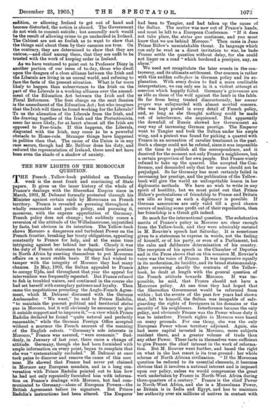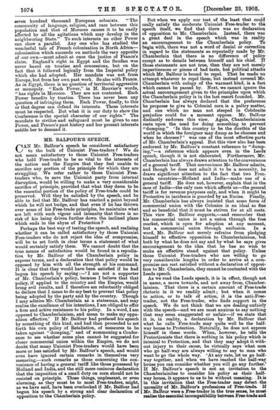T HE French . Yellow-book published on Thursday week is the
most frank and convincing of State papers. It gives us the inner history of the whole of France's dealings with the Shereefian Empire since in March, 1901, M. Delcasse formally protested through his Minister against certain raids by Moroccans on French territory. France is revealed as pursuing throughout a wholly reasonable and pacific policy, and pursuing it, moreover, with the express approbation of Germany. French policy does not change ; but suddenly comes a reversion of the attitude of the Wilhelmstra.sse, unjustified by facts, but obvious in its intention. The Yellow-book shows Morocco a dangerous and turbulent Power on the French frontier, breaking her treaty obligations, appealing constantly to France for help, and at the same time intriguing against her behind her back. Clearly it was the duty of French statesmen to safeguard their position in North Africa by exerting themselves to put Moroccan affairs on a more stable basis. If they had wished to tamper with the integrity of Morocco they had many chances. In May, 1903, the Sultan appealed to France to occupy Ujda, and throughout that year the appeal for intervention was frequently repeated. But France refused to fish in troubled waters, and continued in. the course she had set herself with exemplary patience and loyalty. Then came the negotiations preceding the Anglo-French Agree- ment, which M. Delcass6 discussed with the German Ambassador. " We want," he said to Prince Radolin, "to maintain the present political and territorial status quo in Morocco, but it will obviously be necessary to give it outside support and to improve it,"—a view which Prince Radolin declared he found "quite natural and perfectly reasonable," while the German Foreign Office accepted without a murmur the French account of the meaning of the English entente. " Germany's sole interests iu Morocco," France was assured, " were economic." Sud- denly, in January of last year, there came a change of attitude. Germany, though she had been furnished with ample information on every point, began to complain that she was " systematically excluded." M. Delcasse at once took pains to discover and remove the cause of this sore ness. He showed that France had never yet claimed in Morocco any European mandate, and in a. long con- versation with Prince Radolin pointed out to him how he had not only repeatedly furnished him with informa- tion on France's dealings. with Morocco, but had com- municated to Germany—alone of European Powers—the British. Agreement • before its signature. But Prince Badolin's instructions had been altered. The Emperor had been to Tangier, and had taken up the cause of the Sultan. The matter was now out of France's hands, and must be left to a European Conference. " If it does not take place, the status quo continues, and you must know that we are behind Morocco." Then came in June Prince Billow's unmistakable threat. In language which can only be read as a direct invitation to war, he bade France settle the question without delay, for she could not linger on a road " which bordered a precipice, nay, an abyss.'
We need not recapitulate the later events in the con- troversy, and its ultimate settlement. Our concern is rather with this sudden volte-face in German policy and its ex- planation. With every desire to find a more creditable interpretation, we can only see in it a violent attempt at coercion which happily failed. Germany's grievances are as idle as those of the wolf against the lamb in the fable. So far from being treated discourteously, her amour propre was safeguarded with almost morbid concern. She was kept posted in every detail of French policy, and, so long as she thought nothing could be made out of interference, she acquiesced. But apparently the downfall of Russia showed her Government an easy way of increasing German prestige. The Emperor went to Tangier and took the Sultan under his ample wing, and a pretext was found for picking a quarrel with France in an accusation of cavalier treatment in the past. Such a charge could not be refuted, since it was impossible at the time to publish all the correspondence, and it deceived for the moment not only France's neighbours, but a certain proportion of her own people. But France wisely refused to take up the quarrel. She accepted the Con- ference, and demanded only that her cause should not be prejudged. So far Germany has most certainly failed in increasing her prestige, and the publication of the Yellow- book will give the world an unforgettable lesson in her diplomatic methods. We have no wish to write in any spirit of hostility, but we must point out that Prince Bfilow's protestations of friendship to France and Britain are idle so long as such a diplomacy is possible. If German assurances are only valid till a good chance occurs of making some profit out of their repudiation, then her friendship is a Greek gift indeed.
So much for the international question. The substantive merits of France's policy. in Morocco are clear enough from the Yellow-book, and they were admirably restated in M. Rouvier's speech last Saturday. It is sometimes given to a statesman to express in words, not the feeling of himself, or of his party, or even of a Parliament, but the calm and deliberate determination of his country. The reception of his speech in the Chamber of Deputies and in the Press shows that on this occasion M. Rouvier's voice was the voice of France. It was impressive equally in its moderation, its lucidity, and its broad statesmanship. After reviewing shortly the contents of the Yellow- book, he dealt at length with the general question of the French attitude towards Morocco. It was im- possible, he said, that France should not have a Moroccan policy. At one time they had hoped that the Shereefian Government would be reformed from within ; but the events of the past few years had shown that, left to himself, the Sultan was incapable of safe- guarding the rights of foreigners in his domains or the security of his neighbours. Interference became the only policy, and obviously France was the Power whose duty it was to interfere. French rights in Morocco were based on many grounds. For one thing, she was the only European Power whose territory adjoined. Again, she had more capital invested in Morocco, more subjects resident there, and a greater volume of trade than any other Power. These facts in themselves were sufficient to give France the chief interest in the work of reforma- tion. But M. Rouvier went further, and based the right on what in the last resort is its true ground : her whole scheme of North African civilisation. " If the Moroccan question be reduced to its essential elements, it becomes obvious that it involves a national interest and is imposed. upon our policy, unless we would compromise the great work undertaken by. France in North-West Africa during three-quarters of a century." France is the chief Power in North-West Africa, and she is a Mussulman Power, as Britain is in India and Egypt, and has to maintain her authority over six millions of natives in contact with seven hundred thousand European colonists. " The community of language, religion, and race between this population and that of Morocco causes it to be easily affected by all the agitations which may develop in the neighbouring State." To such interests no other Power can show a parallel. Any one who has studied the wonderful tale of French colonisation in North Africa— colonisation which succeeds on methods the very opposite of our own—must admit at once the justice of France's claim. England's right in Egypt and the Soudan was never based on treaties and concessions, but on the fact that it followed logically from the Imperial policy which she had adopted. Her mandate was not from Europe, but from her own past work. So also with France. As in Egypt, there is no question of territorial aggression or monopoly. " Each Power," in M. Rouvier's words, " has rights in Morocco. They are not contested. Each Power benefits by treaties. There has never been any question of infringing them. Each Power, finally, to this or that degree can defend its interests. These interests must be respected. But what it is our duty to show the Conference is the special character of our rights." lie mandate to civilise and safeguard must be given to one Power, and France's past history and her present interests entitle her to demand it.
MR. BALFOUR'S SPEECH.







































 Previous page
Previous page